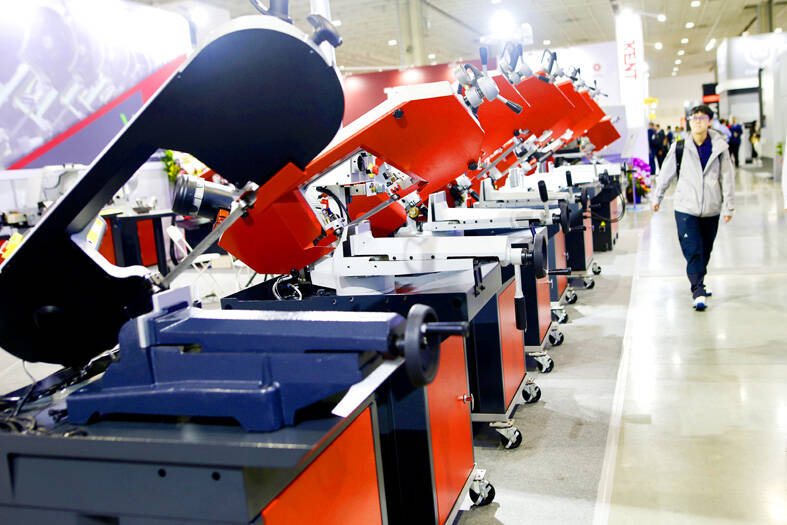The nation’s machinery exports in the first two months of this year rose 1.4 percent year-on-year, the Taiwan Association of Machinery Industry (TAMI, 台灣機械公會) said in a report yesterday.
The association released the data for the first two months to avoid distortions from the week-long Lunar New Year holiday — which was mostly in January this year, but was in February last year — when many businesses and factories were closed.
Taiwan’s machinery exports are mainly comprised of inspection and testing equipment, electronic equipment and machine tools. Overseas shipments totaled US$4.37 billion in January and last month, up from US$4.3 billion in the same period last year, data compiled by the association showed.

Photo: EPA-EFE
The performance echoed the latest purchasing managers’ index for Taiwan’s manufacturing sector, which suggested an improvement in local firms’ operations on the back of more orders, higher production capacity and inventory growth, the Chung-Hua Institution for Economic Research (中華經濟研究院) said on Wednesday last week.
The latest data showed overseas shipments of inspection and testing equipment increased 2.5 percent annually to US$756 million, while electronic equipment shipments rose 14 percent to US$730 million during the first two months.
Exports of machine tools in the first two months declined 18.9 percent year-on-year to US$273 million, with metal-cutting machine tools exports falling 22.2 percent to US$215 million and metal-forming machinery sliding 3.6 percent to US$57.18 million, which was attributed to weak demand.
As many Taiwanese firms received orders and buyer inquiries during the Taipei International Machine Tool Show last week, the association said it maintains a cautiously optimistic view of the segment going forward.
The US and China remained the two largest buyers of Taiwanese machinery products in the first two months at US$1.19 billion and US$923 million respectively, the association said.
The US accounted for 27.2 percent of the nation’s total exports, followed by China at 21.1 percent and Japan at 8.6 percent, whose total purchases reached US$374 billion, the report showed.
Taiwan’s machinery exports to China fell by 1 percent in the first two months, while those to the US rose 8.7 percent, the report said.
Although machinery products might not be directly affected by US President Donald Trump’s trade policies, indirect impacts would be inevitable, as US tariffs could trigger a global trade war, the association said.

SMART MANUFACTURING: The company aims to have its production close to the market end, but attracting investment is still a challenge, the firm’s president said Delta Electronics Inc (台達電) yesterday said its long-term global production plan would stay unchanged amid geopolitical and tariff policy uncertainties, citing its diversified global deployment. With operations in Taiwan, Thailand, China, India, Europe and the US, Delta follows a “produce at the market end” strategy and bases its production on customer demand, with major site plans unchanged, Delta president Simon Chang (張訓海) said on the sidelines of a company event yesterday. Thailand would remain Delta’s second headquarters, as stated in its first-quarter earnings conference, with its plant there adopting a full smart manufacturing system, Chang said. Thailand is the firm’s second-largest overseas

‘REMARKABLE SHOWING’: The economy likely grew 5 percent in the first half of the year, although it would likely taper off significantly, TIER economist Gordon Sun said The Taiwan Institute of Economic Research (TIER) yesterday raised Taiwan’s GDP growth forecast for this year to 3.02 percent, citing robust export-driven expansion in the first half that is likely to give way to a notable slowdown later in the year as the front-loading of global shipments fades. The revised projection marks an upward adjustment of 0.11 percentage points from April’s estimate, driven by a surge in exports and corporate inventory buildup ahead of possible US tariff hikes, TIER economist Gordon Sun (孫明德) told a news conference in Taipei. Taiwan’s economy likely grew more than 5 percent in the first six months

SUPPLY RESILIENCE: The extra expense would be worth it, as the US firm is diversifying chip sourcing to avert disruptions similar to the one during the pandemic, the CEO said Advanced Micro Devices Inc (AMD) chief executive officer Lisa Su (蘇姿丰) on Wednesday said that the chips her company gets from supplier Taiwan Semiconductor Manufacturing Co (TSMC, 台積電) would cost more when they are produced in TSMC’s Arizona facilities. Compared with similar parts from factories in Taiwan, the US chips would be “more than 5 percent, but less than 20 percent” in terms of higher costs, she said at an artificial intelligence (AI) event in Washington. AMD expects its first chips from TSMC’s Arizona facilities by the end of the year, Su said. The extra expense is worth it, because the company is

The seizure of one of the largest known mercury shipments in history, moving from mines in Mexico to illegal Amazon gold mining zones, exposes the wide use of the toxic metal in the rainforest, according to authorities. Peru’s customs agency, SUNAT, found 4 tonnes of illegal mercury in Lima’s port district of Callao, according to a report by the non-profit Environmental Investigations Agency (EIA). “This SUNAT intervention has prevented this chemical from having a serious impact on people’s health and the environment, as can be seen in several areas of the country devastated by the illegal use of mercury and illicit activities,”